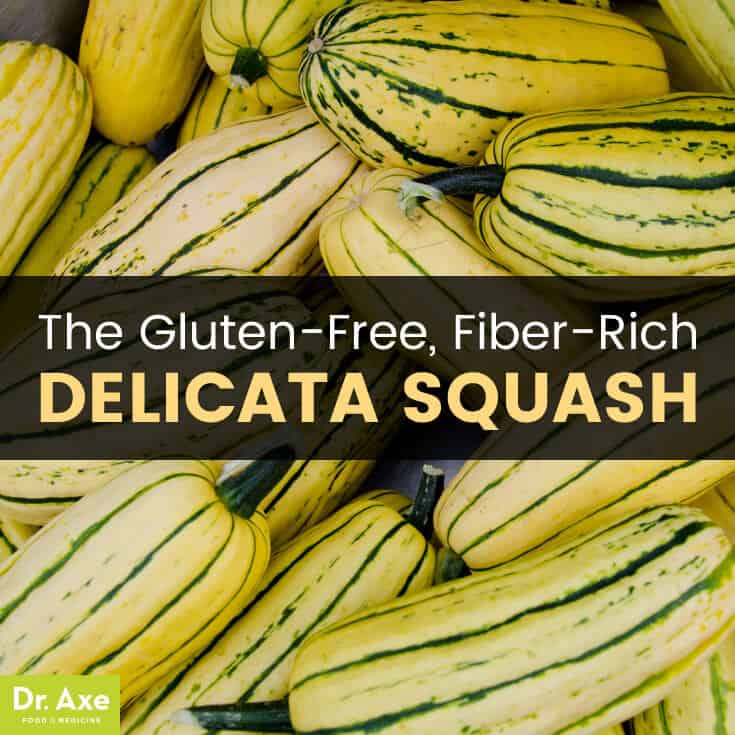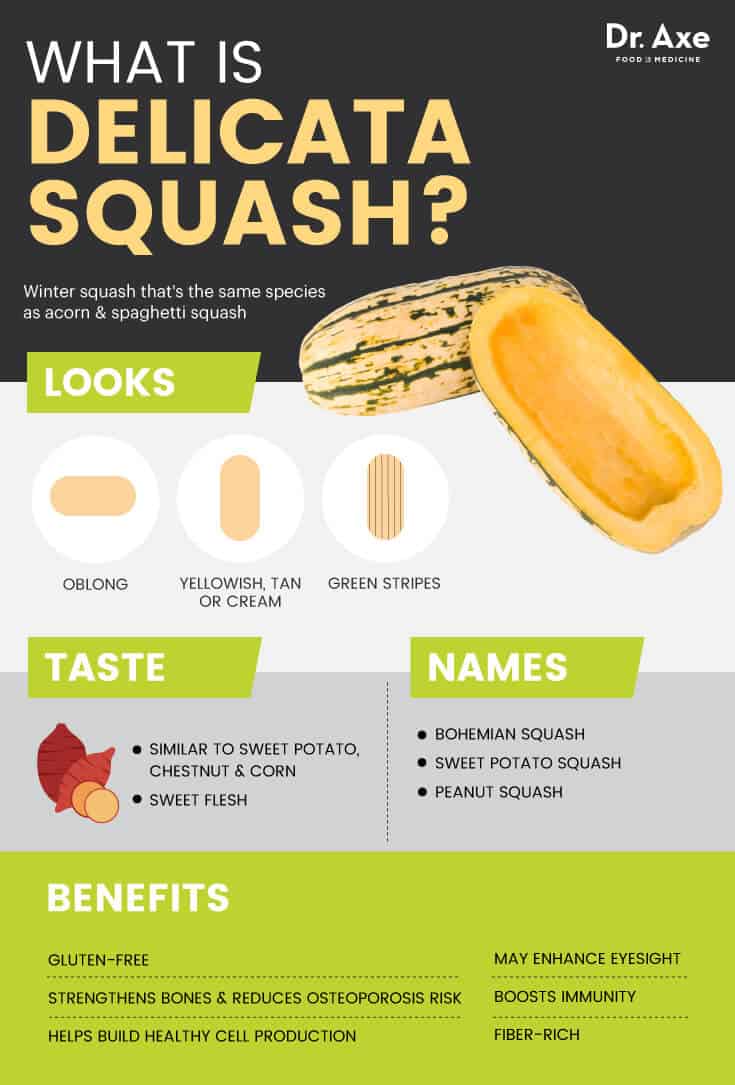
With a flavor similar to the sweet potato, chestnut and corn, the flesh of the delicata squash is sweet. This beautiful design of nature consisting of a cylindrical or oblong shape, yellowish, tan or cream in color with green stripes, is a gluten-free, fiber-rich food full of health benefits perfect for anyone following a gluten sensitivity diet.
Delicata squash is a winter squash that’s also called Bohemian squash, sweet potato squash or peanut squash, and because it holds its shape when cooking, it’s the perfect edible bowl that can be stuffed and baked with meats, quinoa or other delicious foods. Similar to butternut squash nutrition, it’s a healthy alternative with no fat or cholesterol and is low in carbohydrates, all while providing tons of vitamin A and C. (1) And delicata squash benefits don’t stop there.
Benefits of Delicata Squash
1. Great Gluten-Free Option
Most pasta contains gluten, but the delicata squash can be a great alternative to pasta. If you have ever had spaghetti squash topped with tomato sauce, you may want to consider delicata squash in a similar fashion. You can cut the squash into thin noodle shapes, much like zoodles made from zucchini, and lightly sauté, then top with your favorite sauce. (2)
2. Provides Lots of Fiber
The delicata squash is a high-fiber food, with skin particularly holding lots of fiber, and since most Americans don’t get enough fiber every little bit helps. Fiber is super important since it normalizes bowel movements, helps lower cholesterol levels and may help control of blood sugar levels. (3, 4)
3. Helps Healthy Cell Production
The delicata squash contains a good bit of iron. Iron is needed to help with healthy cell production in our bodies. Iron aids with the formation of proteins that are able to provide oxygen to the body, muscles and bloodstream. The growth of the cells requires iron to help with the process.
Conversely, iron deficiency can interfere with this process, so to prevent iron deficiency and enhance healthy cell production, consume this squash.
4. Builds Healthy Bones and Reduces Risk of Osteoporosis
We know that calcium helps promote strong and healthy teeth and bones. Delicata squash contains calcium that can help strengthen those bones, especially as you grow older. To gain healthy bone mass, something crucial for the prevention of osteoporosis, we need plenty of calcium to help restore or minimize any bone loss. It helps early in life, especially those involved in athletics, as well as later in life — in particular for women.
The Consensus Development Conference presented new guidelines at the National Institutes of Health in June 1994, recommending women take 1,000 milligrams of calcium daily. For women over age of 65, 1,500 milligrams per day is suggested. (5)
5. May Enhance Your Eyesight
Delicata squash has a ton of vitamin A, and we are familiar with the fact that vitamin A is crucial for good vision and a healthy set of eyes. This is because in order for us to properly see the the full spectrum light, our eyes must produce certain pigments. If you lack in vitamin A or other eye vitamins, you may not produce these pigments, and that can lead to eye problems, such as night blindness and dry eyes.
According to the American Academy of Ophthalmology, vitamin A deficiency is the No. 1 cause of preventable blindness in the world. It reports that about “250,000 to 500,000 children become blind every year because of vitamin A deficiency.” (6)
6. Helps Keep You Free from Illness
Delicata squash is one of the top vitamin C foods. Vitamin C provides many benefits, and though studies are still being conducted in regard the whether it fights the common cold, evidence suggests it helps boost the immune system. It’s been reported that many cells within the immune system can store vitamin C, which is needed for them to properly protect the immune system. (7)

Delicata Squash Nutrition
Delicata squash is an heirloom variety, which makes it even more special, and is an edible gourd related to the cucumber, watermelon and the muskmelon.
One cup of butternut squash (about 205 grams), very similar to delicata squash, contains about: (8)
- 82 calories
- 21.5 grams carbohydrates
- 1.8 grams protein
- 0.2 gram fat
- 2–4 grams fiber
- 22,869 IU vitamin A (457 percent DV)
- 31 milligrams vitamin C (52 percent DV)
- 0.4 milligram manganese (18 percent DV)
- 582 milligrams potassium (17 percent DV)
- 59.4 milligrams magnesium (15 percent DV)
- 2.6 milligrams vitamin E (13 percent DV)
- 0.3 milligram vitamin B6 (13 percent DV)
- 0.1 milligram thiamine (10 percent DV)
- 2 milligrams niacin (10 percent DV)
- 38.9 micrograms folate (10 percent DV)
- 84 milligrams calcium (8 percent DV)
- 1.2 milligrams iron (7 percent DV)
- 0.1 milligram copper (7 percent DV)
- 55.4 milligrams phosphorus (6 percent DV)
Delicata Squash Recipes
This beautiful delicata squash recipes is sure to enhance any plate and the perfect holiday side dish:
Roasted Delicata Squash Rings
Serves: 4
INGREDIENTS:
- 3 delicata squashes
- 2 tablespoons coconut oil, softened
- Pinch of sea salt
- ½ teaspoon cinnamon
- Freshly ground black pepper
DIRECTIONS:
- Preheat your oven to 400 degrees.
- Line two baking sheets with parchment paper and set aside.
- Wash your delicata squash, then slice it in half horizontally so you preserve a circle shape.
- Scoop out the seeds using a small spoon.
- Then, slice it to make quarter-inch rings.
- In a small bowl, place the remaining ingredients and blend well. If you need, you can lightly warm the ingredients in a small pan so the coconut oil melts.
- Then, toss the rings with the mixture making sure to coat all rings.
- Place the rings in a single layer on the baking sheets.
- Roast for about 20 minutes, then turn them over and roast for another 15–20 minutes until lightly browned on each side.
For more delicata squash recipe ideas, try these below:
How to Select and Use Delicata Squash
It’s best to choose a squash that does not have any scratches or bruises to void quick spoilage. When choosing delicata squash, look for one that’s firm and heavy with a cream color. One that’s ready to eat usually is yellow or cream with green striations. You should be able to store them in a cool, dry place for about three months.
Because the walls of the delicata squash are thin, it tends to cook rather quickly. To prepare delicata squash, you can slice it in quarter-inch rings, then sauté it until soft and a little caramelized, but make sure to remove the seeds first. Similar to the acorn squash, you can halve it, then bake it for about 30 minutes,. Broiling it with olive oil or coconut oil until caramelized is delicious too.
The sugar loaf and honey boat varieties have been crossed with the popular butternut squash and are very sweet. You may notice a bit of a caramel, hazelnut and brown sugar flavor. In fact, these little guys usually don’t stick around the market for too long, so if you see them, make sure to grab a few.
History of Delicata Squash
The delicata squash is part of the same species as the acorn and spaghetti squashes. Seeds of the delicata were sold in 1891, making it popular in the early 20th century. But because the rind of the delicata is edible and not as tough as some other squash varieties, it’s vulnerable to disease, ultimately diminishing its popularity.
There are a few varieties that have been developed, one of which is called Cornell’s Bush Delicata, which was developed by Cornell University. This was considered a huge success for Cornell because it was disease-resistant. In fact, it was award-winning, named as a 2002 All-America Selection, considered the highest honor in the seed industry and the first Cornell University-developed variety to obtain such an award in nearly 40 years. (9)
Others varieties include sweet dumpling, sugar load and honey boat, a sweeter version.
Delicata Squash Side Effects
As with any food, taking note of any unusual reaction, such as itching or swelling, is important, but there are no known problems with the delicata squash. However, because of its fiber content, too much could cause flatulence.
Final Thoughts on Delicata Squash
- Delicata squash is a great option as a side dish, incorporating into quinoa or even as a snack. It’s low-fat and low-carb, and it can adorn any main dish, offering an attractive presentation too.
- Delicata squash works as an edible bowl that can be stuffed and baked with meats, quinoa or other delicious foods.
- It’s a healthy alternative with no fat or cholesterol and is low in carbohydrates, all while providing tons of vitamin A and C.
- The benefits of delicata squash include being a great gluten-free, fiber-rich option that helps healthy cell production, builds healthy bones, reduces the risk of osteoporosis, potentially enhances eyesight and helps fight illness.
- It’s best to choose a squash that does not have any scratches or bruises to void quick spoilage. When choosing delicata squash, look for one that’s firm and heavy with a cream color.